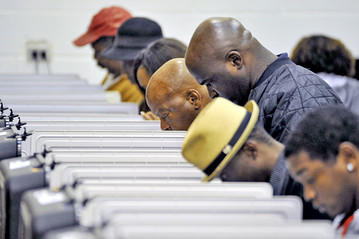
Section Branding
Header Content
In a divided election season, Black voters are poised to make significant impact
Primary Content
LISTEN: GPB’s Peter Biello speaks with Dr. Adrienne Jones, an assistant professor of political science at Morehouse College, about Black voters this election cycle.

Black voters will play an important role in this year’s presidential election in both Georgia and the country as a whole. Some polls have indicated that Black support for Democratic candidates has softened. But with scant polling information, it’s difficult to tell the extent to which this is happening. GPB’s Peter Biello spoke with Dr. Adrienne Jones, an assistant professor of political science at Morehouse College, about Black voters this election cycle.
Peter Biello: You’ve done significant academic research on Black voters' feelings about elections and voting habits. What have you found about Black voters' willingness to engage in the process at all, regardless of the candidate?
Dr. Adrienne Jones: So I would say that the United States has a voter apathy problem overall that preceded the former president's attempt to stoke doubt in our election systems, which from all research, is very strong and accurate. Here in the state of Georgia, we have a really strong voting system that does take accurate information about who's cast ballots and how those ballots have been cast. But nonetheless, I think that there are swaths of voters — and I think that Black people have found themselves sometimes among those people — who feel like their votes really don't matter. So one of the things that I've tried to do over the last couple of years is to really make it clear how close some of these elections are of late, including the presidential election in Georgia in 2020 [and] to inform people that their votes in these particular elections really are making a difference.
Peter Biello: Some polls have found that Black support for Democratic candidates has been softening every four years or so for the past few cycles. Is that what you're seeing?
Dr. Adrienne Jones: I do see that, and I think that that makes some sense, right? Neither of the major political parties is pro-Black. You know, today Black voters are purported and I think accurately referred to as the "backbone of the Democratic Party." But Blackness continues to be as such that the party has rarely, if ever, created policies and positions and sort of very outwardly made it clear their support for the Black community and its needs.
Peter Biello: What will you be watching for on Election Day? Is there a particular data point that you think will reveal something larger about the state of the election or the state of Georgia? Or both?
Dr. Adrienne Jones: I think in terms of the state of the election and the importance of some of these issues to people will be: What does Black support look like for the Democratic Party? What does white female support look like for Kamala Harris, in particular? You know, we are divided along some very racial and gender lines in this particular election. The issue of masculinity is on the table. And this idea that white women might be intimidated not to vote for Kamala Harris, despite their feeling that the reproductive rights issues are incredibly important because of the gender hierarchy, I'll be very interested in seeing how that shakes out. And also that we have been having the discussion — again, inside of the patriarchal masculinity lens — about whether Black men will vote for the Democratic Party and for Kamala Harris in particular, for similar reasons. Because I think that, again, we are talking politics, but these social norms that a lot of times we don't talk about are also coloring how people feel and how they're responding to what their ballot should be.

